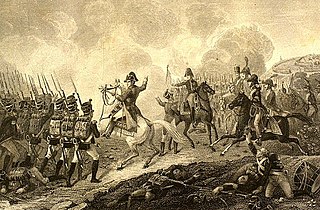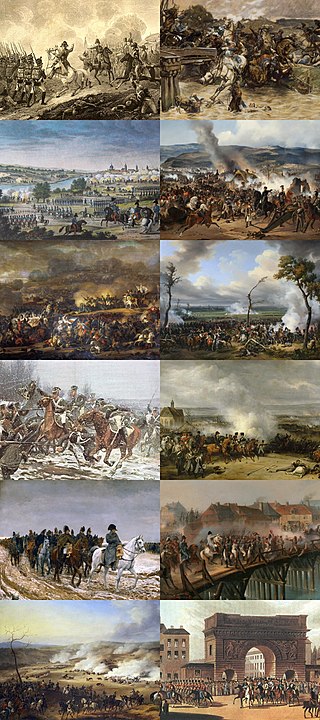The Six-Day War was an armed conflict between Israel and a coalition of Arab states in 1967.
"Six Day War" may also refer to:

1814 (MDCCCXIV) was a common year starting on Saturday of the Gregorian calendar and a common year starting on Thursday of the Julian calendar, the 1814th year of the Common Era (CE) and Anno Domini (AD) designations, the 814th year of the 2nd millennium, the 14th year of the 19th century, and the 5th year of the 1810s decade. As of the start of 1814, the Gregorian calendar was 12 days ahead of the Julian calendar, which remained in localized use until 1923.

The Napoleonic Wars (1803–1815) were a series of conflicts fought between the First French Empire under Napoleon (1804–1815) and a fluctuating array of European coalitions. The wars originated in political forces arising from the French Revolution (1789–1799) and from the French Revolutionary Wars (1792–1802), and produced a period of French domination over Continental Europe. The wars are categorised as seven conflicts, five named after the coalitions that fought Napoleon, plus two named for their respective theatres; the War of the Third Coalition, War of the Fourth Coalition, War of the Fifth Coalition, War of the Sixth Coalition, War of the Seventh Coalition, the Peninsular War, and the French invasion of Russia.
Treaty of Paris may refer to one of many treaties signed in Paris, France:
Sino-Japanese War most often refers to:

In the Battle of Lützen, Napoleon I of France defeated an allied army of the Sixth Coalition.

The United States-led invasion of the Republic of Iraq was the first stage of the Iraq War. The invasion began on 19 March 2003 and lasted just over one month, including 26 days of major combat operations, in which a combined force of troops from the United States, the United Kingdom, Australia and Poland invaded Iraq. Twenty-two days after the first day of the invasion, the capital city of Baghdad was captured by coalition forces on 9 April after the six-day-long Battle of Baghdad. This early stage of the war formally ended on 1 May when U.S. President George W. Bush declared the "end of major combat operations" in his Mission Accomplished speech, after which the Coalition Provisional Authority (CPA) was established as the first of several successive transitional governments leading up to the first Iraqi parliamentary election in January 2005. U.S. military forces later remained in Iraq until the withdrawal in 2011.

The Hundred Days, also known as the War of the Seventh Coalition, marked the period between Napoleon's return from eleven months of exile on the island of Elba to Paris on 20 March 1815 and the second restoration of King Louis XVIII on 8 July 1815. This period saw the War of the Seventh Coalition, and includes the Waterloo Campaign and the Neapolitan War as well as several other minor campaigns. The phrase les Cent Jours was first used by the prefect of Paris, Gaspard, comte de Chabrol, in his speech welcoming the king back to Paris on 8 July.

In the War of the Sixth Coalition, sometimes known in Germany as the Wars of Liberation, a coalition of Austria, Prussia, Russia, Spain, Great Britain, Portugal, Sweden, Sardinia, and a number of German States defeated France and drove Napoleon into exile on Elba. After the disastrous French invasion of Russia of 1812 in which they had been forced to support France, Prussia and Austria joined Russia, the United Kingdom, Sweden, and Portugal, and the rebels in Spain who were already at war with France.

The Mahdi Army was an Iraqi Shia militia created by Muqtada al-Sadr in June 2003 and disbanded in 2008.

The Six Days Campaign was a final series of victories by the forces of Napoleon I of France as the Sixth Coalition closed in on Paris.

The Battle of Paris was fought on 30–31 March 1814 between the Sixth Coalition, consisting of Russia, Austria, and Prussia, and the French Empire. After a day of fighting in the suburbs of Paris, the French surrendered on 31 March, ending the War of the Sixth Coalition and forcing Emperor Napoleon to abdicate and go into exile.

The Swedish–Norwegian War, also known as the Campaign against Norway, War with Sweden 1814, or the Norwegian War of Independence, was a war fought between Sweden and Norway in the summer of 1814. According to the Treaty of Kiel, Norway would enter a union with Sweden under Charles XIII of Sweden. The war resulted in Norway being forced into the United Kingdoms of Sweden and Norway, but with its own constitution and parliament. The war marked the last time Sweden participated in an armed conflict with another nation, and its conclusion signalled the beginning of the country's long period of military neutrality.
The Battle of Courtrai or Kortrijk may refer to:
Six days or Six Days or 6 Days may refer to:
A coalition is a pact or treaty among individuals or groups, during which they cooperate in joint action, each in their own self-interest, joining forces together for a common cause.
Siege of Antwerp may refer to:
The Arab–Israeli war normally refers to:

The French Revolutionary and Napoleonic Wars, sometimes called the Great French War, were a series of conflicts between the French and several European monarchies between 1792 and 1815. They encompass first the French Revolutionary Wars against the newly declared French Republic and from 1803 onwards the Napoleonic Wars against First Consul and later Emperor Napoleon Bonaparte. They include the Coalition Wars as a subset: seven wars waged by various military alliances of great European powers, known as Coalitions, against Revolutionary France – later the First French Empire – and its allies between 1792 and 1815:
Bloody Sunday may refer to: